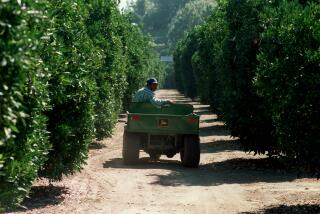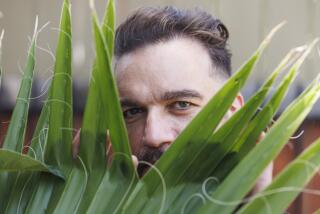Garden Owner Says He’s Not a Bad Guy
- Share via
Ralph Horowitz wants the world to know he isn’t a villain.
All he has wanted to do for years, he says, is develop 14 acres he owns in South-Central Los Angeles. But almost 20 years ago, near the beginning of his career as a developer, he was an unwilling seller when Los Angeles used the power of eminent domain to take the land for a proposed power plant.
“The city of Los Angeles wanted to build a trash-to-energy facility,” said Horowitz. “They came across this piece of land and they just took it.”
That idea eventually was scrapped because of community opposition, and the city allowed a community garden the size of 14 football fields to grow on the land. Low-income farmers tilled the soil for 12 years, feeding their families and making a little money on the side.
Last year, after a long legal battle, the land was transferred back to Horowitz. Now, he complains, he is sometimes portrayed as the bad guy -- and all because he wants to use land he says he never should have lost.
The gardeners, about 350 families, refuse to go.
“We are farmers, and farmers have extraordinary resilience,” said Tezozomoc, a gardener who uses just one name. He later said that if Horowitz were “a man of morals ... then he would have demanded we be active participants” in deciding what to do with the land.
The garden was originally scheduled to close Feb. 29. A judge last month buoyed farmers’ hopes when he granted a temporary restraining order to halt removal of the garden until a March 16 court date. The gardeners asked the judge to permanently bar Horowitz from evicting them.
Horowitz, who hopes to build warehouses or a cold-storage facility on the site, said he once sympathized with the gardeners.
“My gut reaction was that they seemed like they enjoyed what they were doing, and I hated to bring it to an end,” Horowitz said, “but it was time.”
Businesspeople “are used to hassle all the time,” Horowitz said. In the last 25 years, the 66-year-old developer has worked on commercial and residential projects citywide. But this South-Central case, he later said, “is kind of like someone moving into your parents’ backyard and pitching a tent and saying, ‘Look, we are going to stay here.’ ”
Ronald Kaye, a lawyer trying to keep the garden open, says he understands that Horowitz just wants his land. But Horowitz “should not be portrayed as a victim,” Kaye said, because it’s the farmers who will suffer a decline in their quality of life.
The saga has gone on for so long that neither Horowitz nor city officials can pinpoint exactly when the city bought the property. Written records are unclear, but the transfer occurred sometime in the mid-1980s.
The garden has continued under a month-to-month lease managed by the nonprofit Los Angeles Regional Food Bank. Each plot owner pays the food bank $12 a month for water, waste removal and portable toilets.
Horowitz said that when he originally gave up the land, the city guaranteed he would have the first chance to buy it back if it ever came back up for sale. But in 1994, the land was sold to the Harbor Department. Horowitz successfully sued to buy it back. Terms of the sale are confidential, but when the city took the land in the 1980s, the lot was assessed at $5.9 million.
And though he once again owns the land, Horowitz says he just can’t win.
The farmers of the community garden, united in a group called South Central Farmers Feeding Families, have said that after so much time, they feel the land is theirs. They also say they have created a haven in a smog- and violence-filled city.
Horowitz said he has a different take on things: “No good deed goes unpunished.”
At the request of Councilwoman Jan Perry, who represents the area, Horowitz said he allowed the gardeners 60 days -- twice the required amount of time -- to vacate the land. Perry, meanwhile, has been trying to find alternative sites for the farmers.
But Horowitz and some farmers have said there may be no agreeable solution.
“The farmers have three scapegoats,” Horowitz said. “One is me, one is the food bank and one is the city of Los Angeles. All of us are bad guys for permitting them to stay on the land for free.”






